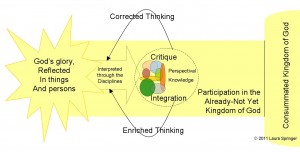Why should we become better interpreters of glory? There ought to be something beyond the pleasure of the knowing (though this is a worthy secondary purpose). I will suggest discerning and interpreting glory as an inherent component of the reformation impulse that flows out of the sanctification process toward the Kingdom of God.
In his book, Creation Regained, Wolters offers a good model of worldview construction that seeks to discern creational structure and reform creaturely direction. He captures well the comprehensive nature of creation: that there is no sacred-secular divide, for Christ is Creator and Lord of all. He also correctly calls for Christian participation in restoration. Unfortunately, his model seems to stop at restoration, with the goal of redemption in Christ as restoring creation to its intended goodness and rightful rule. Restoration is a worthy goal inside of time, but passages like Revelation 21:1-5 go beyond the restoration of newness to a wholly new newness in Christ. So, while restoration of creational goodness is a worthy activity, it is an insufficient end. Only the new newness of the Kingdom will suffice and our yearning for transcendence knows this very well.
 The original version of my glory-centered integration model only implies a Kingdom goal. This version attempts to do so explicitly. If sanctification tends toward the Kingdom and participation in reformation is part of our sanctification, then discerning and interpreting glory should reorient our thinking and acting, bringing us more in line with Kingdom life and thought. Revelation 21 describes the heavenly Jerusalem as having the glory of God for its light. It seems that the glory of God is the eternal atmosphere of the Kingdom. If this is the case, we ought to spend our life in time preparing for this atmosphere, training our souls to recognize God’s glory in its many revelations. For as surely as he is the author of all, his glory flows through all, even if hidden under the corruption of human mutiny.
The original version of my glory-centered integration model only implies a Kingdom goal. This version attempts to do so explicitly. If sanctification tends toward the Kingdom and participation in reformation is part of our sanctification, then discerning and interpreting glory should reorient our thinking and acting, bringing us more in line with Kingdom life and thought. Revelation 21 describes the heavenly Jerusalem as having the glory of God for its light. It seems that the glory of God is the eternal atmosphere of the Kingdom. If this is the case, we ought to spend our life in time preparing for this atmosphere, training our souls to recognize God’s glory in its many revelations. For as surely as he is the author of all, his glory flows through all, even if hidden under the corruption of human mutiny.

